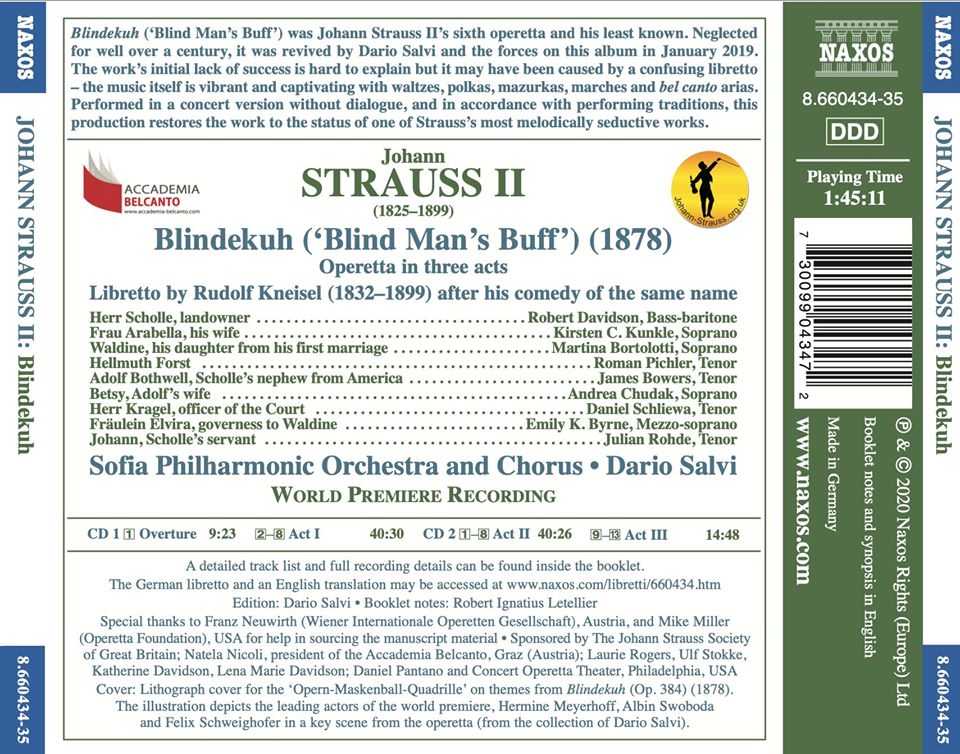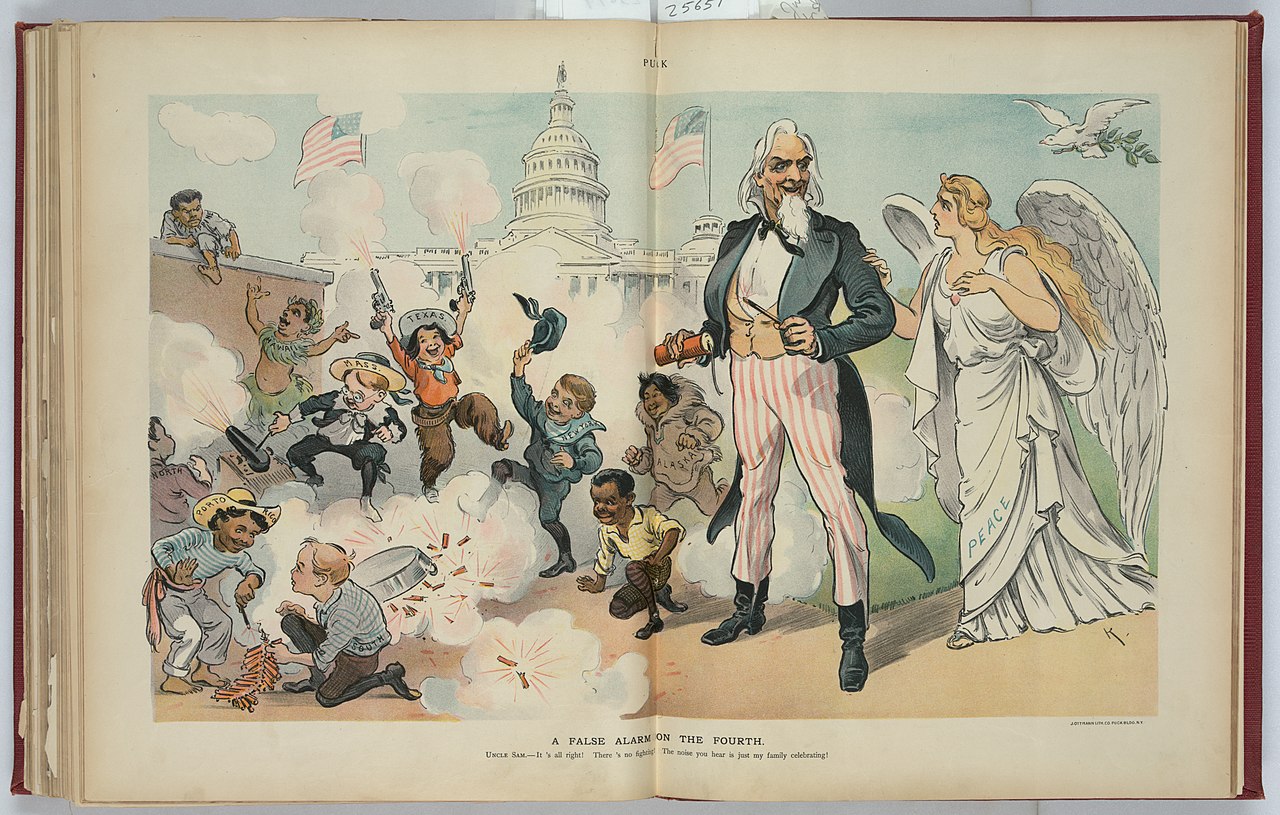Kevin Clarke
Operetta Research Center
1 February, 2020
As part of their Johann Strauss “rediscovery series” the label Naxos is releasing the 1878 operetta Blindekuh which premiered at the Theater an der Wien with a superstar cast that included Hermine Meyerhoff and Alexander Girardi among others. It’s a kind of Vetter aus Dingsda tale about a rich nephew from overseas who is supposed to save the lives of a ruined family by marrying the family’s daughter. The daughter’s real lover poses as the American nephew and gets his girl with a whole string of tricks. Now, the long forgotten score is given a new interpretation and world premiere recording by conductor Dario Salvi and the Sofia Philharmonic Orchestra, with an international cast of nine soloists.

The cover of the 2020 recording of “Blindekuh” on Naxos, conducted by Dario Salvi.
When you take a look at the Viennese press to find out more about the premiere in 1878 you read that the opening night was received “almost enthusiastically” and “in parts rapturously,” which is somewhat surprising considering that Blindekuh was “a flop” that only lasted for 16 performances.
The audience supposedly cheered “their musical prophet” Strauss. And according to the paper Die Presse the positive effect of this operetta was “mainly based on a string of couplets with all sorts of drastic effects and some funny ensembles.” Add to this “a very elegant and luxurious setting” (which included “piquant” dresses for the leading ladies in act 3 where they showed off their bare shoulders).
Talking of the performers: the press praised “the animated élan with which everyone presented their parts, strongly marked (stark pointiert) in the way everything was sung and acted.”
Bel Canto Arias
Such remarks are not unusual, since a “pointed” way of interpreting operetta was the norm back then, also the erotic allure of the ladies. That they could all act and (!) sing is one of the many things that have since been lost in operetta performance history. And it will be interesting to see if Dario Salvi’s cast on Naxos has been guided by him to try such a “pointed” sing-acting interpretation of the music, or whether it’s just another one of those well-intended “sing through” performances by modern-day opera singers with little to no feeling for the specifics of a 1870s operetta and its joys. (The fact that Naxos promises “bel canto arias” on the back of the CD as part of their Blindekuh experience is a bit worrying.)

The back side of the new “Blindekuh” recording on Naxos.
So what is the show about? Let’s quote to plot summary from Die Presse:
“A land owner is almost ruined by the lavish spending of his second wife on fashion. He moves to the country and hopes that by marrying his daughter from a first marriage to a rich nephew from American he can rearrange his fate. This nephew is bound by a family contract to marry his cousin or alternatively pay 40,000 dollars penalty (Reugeld). At the beginning of the operetta the real lover of the daughter appears instead of the American. He is mistaken by the father for the nephew and greeted as such. He forces the wasteful and extravagant stepmother whose jewelry and dressmaker bills he has acquired and paid to support his plans. Eventually he even wins over the real American nephew who is already married and happy to pay the penalty for the continuation of the Blindekuh-Spiel, i.e. changed identity role play. It ends, of course, with the engagement of the couple.”
The paper adds that the “changing of names and identities leads to numerous confusions during which the lover is taken to be the killer of the American, among other things, who he is supposed to have robbed.” In consequence he is persecuted by the police – a role that Felix Schweighofer played at the premiere, as a sneaky detective always fearing the worst. The other comic role went to Mr. Girardi as a “dimwitted” factotum who sings in fake French (“Toujours perdix, c’est dégoutant”) and who gets to do a bird imitation of swallows. It brought the house down.
Living In America
Meanwhile Albin Swoboda came in singing “Und also lebet man la la, bei uns dort in Amerika”, i.e. “And that’s how we – la la – live over there in America.” He actually says a few lines in English: “It’s very beautiful, la, la , la / This living, In America.” He goes on to explain: “America is a wonderland. So beautiful and big, so powerful. Europe? Bah, no comparison, There’s not only Republicans, Africans too, black by nature, Indians are also lurking there, Scalping behind bush and shrub. Everybody there does what they want. […] You do not need to study there, […] Money in the end is the main subject there.”

A 1902 cartoon from the magazine “Puck” celebrating the Fourth of July and ethnic pluralism in the USA. The caption reads: “A False Alarm on the Fourth” Uncle Sam tells Lady Peace: ‘It’s all right. There’s no fighting. The noise you hear is just my family celebrating!’”
That’s the translation given in the libretto to the new Naxos recording (you can download it for free here), a recording on which dashing Roman Pichler takes the tenor role of the lover who outwits everyone to get his beloved Waldine (sung by Martina Bortolotti). You can hear Mr. Pichler on YouTube in various operetta roles.
You can also hear Miss Bartolotti on YouTube singing operetta, e.g. Giuditta’s “Meine Lippen, sie küssen so heiß”:
The Girardi role of Johann-the-factotum is given to Julian Rohde who was in the recent Offenbach production of Die Prinzessin von Trapezunt in Hildesheim as Prince Raphael (conducted by Adam Benzwi).
Recylced Music
The German Wikipedia page has a few interesting facts about the music. It states that the act 2 waltz “Blindekuh!, Blinde Kuh!“ was recycled by Ralph Benatzky in 1928 for his Strauss pasticcio Casanova, written for Erik Charell and the Große Schauspielhaus Berlin. It became as big hit as Laura’s chorus with the nuns and his been recorded by nearly every famous soprano from Elisabeth Schwarzkopf to Lucia Popp and Kiri te Kanawa.
Also, composer Peter Kreuder supposedly used a polka from Blindekuh as the basis for a slow waltz that became the famous Sag beim Abschied leise Servus. It was recently included on the Jonas Kaufmann operetta album.
While Laura’s prayer-with-nuns and Sag beim Abschied leise Servus have become beloved repertoire classics the only number from the actual operetta Blindekuh to have been performed and recorded with some regularity is the overture. Strauss had presented is ahead of opening night at a concert of the Concordia Academy, and it immediately earned strong applause (it contains the famous Laura theme from Casanova right in the opening bars, played by horns).
Whether Dario Salvi and his Sofia forces will earn such applause remains an interesting question. We will find out in March 2020. And we look forward to also finding out which other Strauss rarities might be included in the series.
For further details, click here.

Well…..included in the series are WALDMEISTER and INDIGO!
For fans of Operetta and the music of Johann Strauss II, this is wonderful news. One day, hope there is a complete recording of his only Opera: Ritter Pazman.
Thank you for the suggestion…..I think we can do that!
Is a wonderfoul notice for the Strauss´s followers! And the nexts recordings of Waldmeister and Indigo is amazing too!
And Cagliostro in Wien on CD!